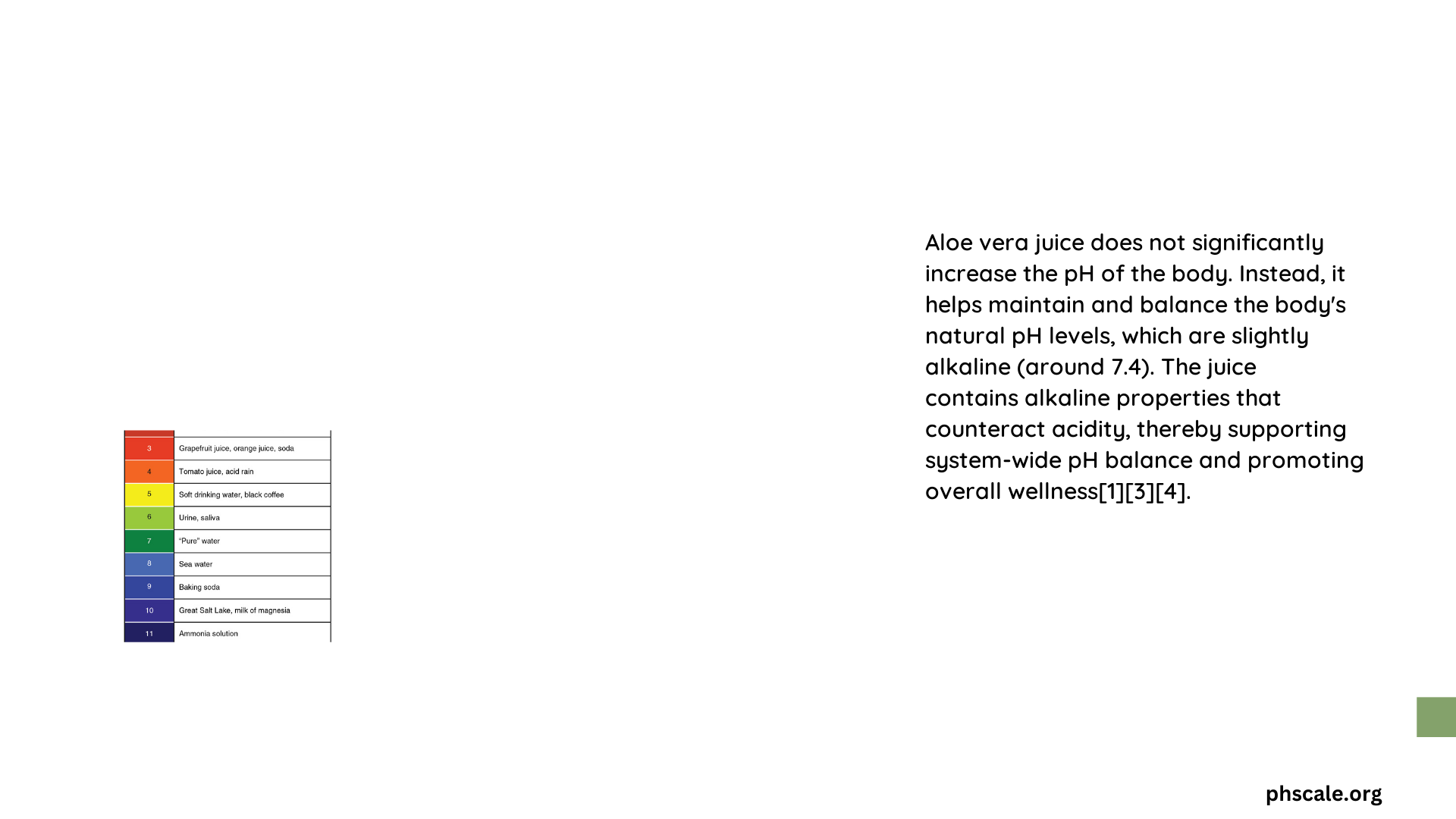Aloe vera juice, known for its potential health benefits, has a complex relationship with pH levels. Contrary to what some might assume, pure aloe vera juice is actually slightly acidic. This article explores the impact of aloe vera juice on pH levels in various contexts, from its natural state to its effects on biological systems. Understanding these pH interactions is crucial for those considering aloe vera juice for health or cosmetic purposes.
What is the pH Level of Pure Aloe Vera Juice?
Pure aloe vera juice typically has an acidic pH level. The exact pH can vary depending on the source and processing methods, but it generally falls within the following ranges:
- 4.5 to 5.5 for aloe vera water
- 3.5 to 4.5 for pure aloe vera juice
This places aloe vera juice in the mildly acidic category, similar to many fruit juices. It’s important to note that this pH level is lower than neutral (pH 7) but higher than highly acidic substances like stomach acid or vinegar.
How Does Aloe Vera Juice Affect pH in Aqueous Solutions?

When aloe vera juice is added to water or other aqueous solutions, it tends to lower the overall pH due to its acidic nature. This effect can be significant in certain applications:
- In cosmetic formulations, the addition of aloe vera juice may require pH adjustment to prevent emulsion separation.
- In beverages, aloe vera juice can contribute to a slightly tart taste due to its acidity.
However, the exact change in pH depends on several factors:
- The initial pH of the solution
- The amount of aloe vera juice added
- The presence of other pH-altering ingredients
Does Aloe Vera Juice Change Body pH When Ingested?
The effect of aloe vera juice on body pH when ingested is more complex than its direct pH in solution. Here’s what research suggests:
-
Digestive System: Aloe vera may help balance stomach pH, potentially alleviating symptoms of acid reflux or indigestion. However, it doesn’t significantly alter the overall acidity of the stomach, which needs to remain acidic for proper digestion.
-
Systemic pH: There’s limited evidence to suggest that aloe vera juice can significantly alter the body’s overall pH. The human body has robust systems in place to maintain a narrow pH range in the blood and tissues.
-
Urine pH: Some proponents claim that aloe vera juice can make urine more alkaline, but scientific evidence for this is lacking.
What Are the pH Effects of Aloe Vera on Skin?
Aloe vera’s interaction with skin pH is one of its most notable and beneficial effects:
- Skin pH Balance: Aloe vera helps maintain the skin’s natural pH balance, which is typically between 4.5 and 5.5.
- Protective Barrier: By supporting the optimal skin pH, aloe vera helps maintain the skin’s protective barrier function.
- Acne Prevention: The pH-balancing effect may help prevent acne by creating an environment less favorable for acne-causing bacteria.
| Skin Condition | Normal pH Range | Aloe Vera’s Effect |
|---|---|---|
| Healthy Skin | 4.5 – 5.5 | Maintains balance |
| Acne-prone | Often > 5.5 | May help lower pH |
| Dry/Sensitive | Often < 4.5 | May help raise pH |
Can Aloe Vera Juice Alter pH in Other Biological Systems?
Aloe vera’s pH-altering effects extend beyond the skin:
-
Scalp Health: Similar to its effect on skin, aloe vera can help maintain the natural pH balance of the scalp, potentially improving hair health.
-
Oral Health: Some studies suggest that aloe vera mouthwash can help balance oral pH, which may be beneficial for dental health.
-
Wound Healing: The pH-balancing effect of aloe vera may contribute to its wound-healing properties by creating an optimal environment for tissue repair.
What Are the Implications of Aloe Vera’s pH Effects for Health and Beauty?
Understanding aloe vera’s pH effects has several implications:
- Skincare Formulations: Cosmetic manufacturers can leverage aloe vera’s pH-balancing properties in products for various skin types.
- Digestive Health Products: Aloe vera’s potential to balance stomach pH makes it a popular ingredient in digestive health supplements.
- Natural Remedies: The pH effects of aloe vera contribute to its popularity in natural remedies for conditions like acid reflux or skin irritations.
However, it’s crucial to note that while aloe vera can influence pH in specific applications, it does not significantly alter the body’s overall pH balance when ingested.
How Should Aloe Vera Juice Be Used for Optimal pH Benefits?
To maximize the potential pH benefits of aloe vera juice:
- For skin application:
- Use pure, high-quality aloe vera gel or juice
- Apply directly to clean skin
-
Use as a base for DIY skincare recipes
-
For internal use:
- Choose a reputable brand of aloe vera juice
- Start with small amounts to assess tolerance
-
Consult a healthcare provider before using aloe vera for digestive issues
-
For hair and scalp:
- Use aloe vera as a pre-shampoo treatment
- Mix with your regular shampoo or conditioner
Remember, while aloe vera juice doesn’t increase pH in most contexts, its ability to help balance pH in specific applications makes it a valuable ingredient in many health and beauty regimens.
